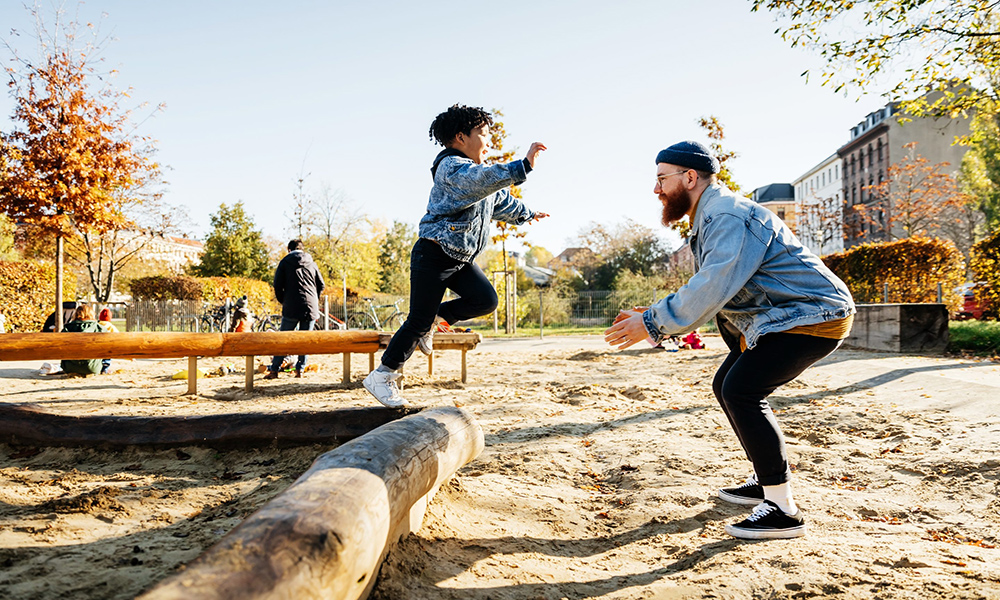
42岁那年,库尔特·威尔为了照顾刚出生的孩子辞去了工作。
当时他正供职于道琼斯(Dow Jones),签的是定期聘用合同。通勤是一件异常痛苦的事情,往返几乎四个小时,而且他的薪资基本与聘请保姆的成本相当。
与此同时,他的妻子在时代华纳公司(Time Warner)担任公司内部的反垄断律师,有着“更好的职业前景”,他对《财富》杂志表示。
因此,两口子“很快决定”由威尔居家照顾女儿,以及两年后出生的儿子。
像他这样的父亲越来越多,他们承担的都是义务工作,包括当孩子的司机、保姆、清洁工和私人厨师,不过这一角色在历史上始终都是由母亲来承担。
皮尤研究中心(Pew Research Center)新发布的分析显示,如今,全职奶爸在全职父母中的占比达到了18%。
然而,当威尔在20年前开始成为全职奶爸时,居家父亲少的可怜,在千禧年之交时的比例仅有5%。
过去30年,这个数字几乎翻了一番。威尔说:“可以肯定的是,无论在一天的哪个时间段,我都看到有更多的父亲在游乐场陪孩子。”
大卫·默里·琼斯也是一位新时代全职奶爸。
他刚刚辞去了其广告销售工作,以照顾其第三个孩子佩吉,而他的妻子梅格则经营着自己的公司Postpartum Plan。
默里·琼斯说:“与孩子们相处是一件非常不可思议的事情,积极融入学校工作以及社区亦是如此。如果遇到问题,学校如今就会通知我和梅格,而且我已经加入了班级的WhatsApp群。”
为什么全职奶爸会突然增多?
皮尤的研究称,美国居家奶爸的比例此前受到了经济下行的助推,2008年金融危机期间,居家奶爸的比例便出现了激增。
然而,随着经济的增强,全职奶爸的比例逐渐下滑,直到新冠疫情爆发。
即便在英国,研究显示,居家奶爸的数量在新冠疫情期间增长了三分之一。这一现象凸显了全球文化的转变,因为很多男性首次被迫在远程工作时承担照顾孩子的责任。
与之前的几代人不同的是,如今的父亲不仅仅是因为最近的冲击或生病导致的失业,才开始照顾自己的孩子。
研究显示,越来越多的男士选择待在家中的唯一原因就是照顾其家人和家庭,而不是因为生病、退休或无法找到工作。
最终,很多父亲如今都特意选择带孩子而不是养家糊口。
为什么会突然改变想法?《财富》杂志采访的多位全职父亲提到了社会对男性期许的转变——即不再做家庭的男主人,或不健康地压抑自身情绪,他们称这种转变是越来越多的父亲选择居家照顾孩子的关键因素。
默里·琼斯说:“男性开始意识到,他们错过的重要早间和睡前时光越来越多。”

此外,在大多数情况下,成为居家奶爸也有其经济合理性。
随着越来越多的女性在职业稳定性以及收入方面超过其配偶,越来越多的父亲就成了收入较低的一方,并因此而离开工作,开始照顾孩子。
成为居家奶爸的董事总经理弗兰克·哈蒙告诉《财富》杂志:“当时,我的妻子梅甘是美国最大的家庭律所Schiller, DuCanto & Fleck LLP的高级合伙人,而且她希望继续追求其事业,成为公司的执行合伙人。”
他说:“很明显,最好的解决办法就是我成为全职父亲,这样,我的妻子就能够继续发展其事业,并追求其职业抱负。我们的观点当时是,而且依然是,我们会共同掌管家庭,这意味着无论谁更适合担任某个角色或承担某项职责,那么就由谁来做这件事情。”
威尔回答说:“可以毫不夸张地说,每一位成功高管的背后总有一位有时间并愿意打理家庭事务的配偶。”
益处多于弊端
与全职太太一样,放弃自己工作来照看孩子的主要弊端就是可能会与世隔绝。
威尔警告道:“我喜欢社交和参与理智探讨,但我现在成天跟两个婴儿混在一起。每天的工作,尤其是孩子还小的时候,都异常单调乏味。”
相对来讲,全职奶爸的比例依然不高,而且有意思的是,我们也很难找到其他有着类似想法的成年人,并与其沟通。
在哈蒙的眼中,冬天对全职奶爸来说尤为难熬。
他说:“在夏天,找人一块打高尔夫、航行或共进午餐并非难事。”然而,随着天气变得糟糕,而且无法打高尔夫,更加寒冷的季节变得漫长而又孤独。
实际上,放弃职业成为全职奶爸的另一个明显弊端在于——放弃自己的职业。
这也是为什么一些父亲对《财富》杂志表示,他们依然会留意职场的原因,他们会承担兼职工作,或在特定的时间辞去工作来照看孩子,而不是永远离开职场。

最终,在所有《财富》杂志采访的父亲看来,与他们与孩子建立的感情相比,成为全职奶爸的缺点就不值一提了。
让-路易斯·萨法里表示:“成为全职奶爸的益处比我想象的要好多了。”他在2004年放弃了自己在金融服务行业的工作,转而居家照看孩子。
“居家的这段日子让我与孩子们变得无比亲近。我不仅深入了解了每个孩子的个性,同时也对自己有了更多的了解。”
确实,有父亲陪伴对孩子而言是一件非常好的事情。然而很明显,父亲在育儿方面的长期参与对孩子和父亲来说都是有益的。
其一,威尔强调称,与孩子一道在家中/公园/游乐场/学校嬉闹要远好于在小隔间里工作一天。此举也让他有时间来追求其自身爱好,并管理家庭的各种财产。
哈蒙对比表示同意,他指出:“成为居家奶爸之后,进行训练跑、物理疗法以及按摩预约也更加方便,如果我在外全职工作的话,这些就都很难实现。”
与此同时,默里·琼斯称,他休了六个月时间的假来照看家中新增添的人丁,这对他的婚姻十分有利。
他说:“这样做不仅对孩子好,也有利于我们的夫妻关系。我十分幸运的是,我的工作能够让我休这么长时间的假,来支持我的妻子,并与孩子们相处,我认为,应该允许更多的配偶将这种长假作为标配。”
事实上,对于用换尿布来替换发电子邮件一事,所有《财富》杂志采访的居家奶爸都不曾感到有任何后悔。
他们在照看孩子之余都做什么
最终,孩子们会长大然后上学,因此全职居家的必要性可能会随着时间的推移而降低。
然而,在休假照看孩子之后再次回归工作并重塑职业,这件事本身就是一个巨大的障碍,至少对母亲而言是这样的。
在很大程度上,照看孩子对于《财富》杂志采访的全职奶爸的职业来说并没有什么不利影响。
默里·琼斯打算在9月回归工作,而且哈蒙在三年前便加入了投资管理公司美林(Merrill),担任私人财富经理。
与此同时,萨法里在照看孩子的同时还干起了兼职工作。
他说:“在我当奶爸的过程中,我尝试通过多种方式来维持生活平衡,同时为家庭财务做贡献。”萨法里还表示自己曾经尝试做过Uber的司机,然后又成为了Rubi Rides的“创建司机”,这是一家专为儿童打造的拼车服务公司。
他说:“零工经济以及像Rubi这样的解决方案可以让父亲和全职父母做到鱼与熊掌兼得,也就是既能照顾好孩子,又可以拥有稳定的收入。”
另一方面,威尔的女儿如今即将迈入大学,然而他依然在照看家庭。
威尔一开始并没有打算一直做全职奶爸工作。他说:“当妻子和我开始踏上这条道路时,其实我们也不确定我是否能够成天围着孩子转。”
然而随着孩子的长大,威尔并没有觉得自己渴望回归职场。
在拿到国际关系的博士学位之前,他还从事过一系列工作,从金融信息一直到滑雪教学,威尔说,他并没有与任何工作或行业进行“捆绑”。
此外,威尔在家里还有很多工作需要打理,包括管理夫妻财产,以及全面翻修位于布鲁克林的一栋赤褐色砂石建筑。
如今,刚刚度过60岁生日的他又拿到了另一项翻修工作,一栋位于伯克希尔的房子,接下来将占用其两年到三年的时间。
威尔补充说:“有时候我会觉得挺遗憾,因为自己在任何领域都没有什么有建树的工作,尽管我没有做到这一点,但我对于当前的这种状态依然非常满意。”(财富中文网)
译者:冯丰
审校:夏林
42岁那年,库尔特·威尔为了照顾刚出生的孩子辞去了工作。
当时他正供职于道琼斯(Dow Jones),签的是定期聘用合同。通勤是一件异常痛苦的事情,往返几乎四个小时,而且他的薪资基本与聘请保姆的成本相当。
与此同时,他的妻子在时代华纳公司(Time Warner)担任公司内部的反垄断律师,有着“更好的职业前景”,他对《财富》杂志表示。
因此,两口子“很快决定”由威尔居家照顾女儿,以及两年后出生的儿子。
像他这样的父亲越来越多,他们承担的都是义务工作,包括当孩子的司机、保姆、清洁工和私人厨师,不过这一角色在历史上始终都是由母亲来承担。
皮尤研究中心(Pew Research Center)新发布的分析显示,如今,全职奶爸在全职父母中的占比达到了18%。
然而,当威尔在20年前开始成为全职奶爸时,居家父亲少的可怜,在千禧年之交时的比例仅有5%。
过去30年,这个数字几乎翻了一番。威尔说:“可以肯定的是,无论在一天的哪个时间段,我都看到有更多的父亲在游乐场陪孩子。”
大卫·默里·琼斯也是一位新时代全职奶爸。
他刚刚辞去了其广告销售工作,以照顾其第三个孩子佩吉,而他的妻子梅格则经营着自己的公司Postpartum Plan。
默里·琼斯说:“与孩子们相处是一件非常不可思议的事情,积极融入学校工作以及社区亦是如此。如果遇到问题,学校如今就会通知我和梅格,而且我已经加入了班级的WhatsApp群。”
为什么全职奶爸会突然增多?
皮尤的研究称,美国居家奶爸的比例此前受到了经济下行的助推,2008年金融危机期间,居家奶爸的比例便出现了激增。
然而,随着经济的增强,全职奶爸的比例逐渐下滑,直到新冠疫情爆发。
即便在英国,研究显示,居家奶爸的数量在新冠疫情期间增长了三分之一。这一现象凸显了全球文化的转变,因为很多男性首次被迫在远程工作时承担照顾孩子的责任。
与之前的几代人不同的是,如今的父亲不仅仅是因为最近的冲击或生病导致的失业,才开始照顾自己的孩子。
研究显示,越来越多的男士选择待在家中的唯一原因就是照顾其家人和家庭,而不是因为生病、退休或无法找到工作。
最终,很多父亲如今都特意选择带孩子而不是养家糊口。
为什么会突然改变想法?《财富》杂志采访的多位全职父亲提到了社会对男性期许的转变——即不再做家庭的男主人,或不健康地压抑自身情绪,他们称这种转变是越来越多的父亲选择居家照顾孩子的关键因素。
默里·琼斯说:“男性开始意识到,他们错过的重要早间和睡前时光越来越多。”
此外,在大多数情况下,成为居家奶爸也有其经济合理性。
随着越来越多的女性在职业稳定性以及收入方面超过其配偶,越来越多的父亲就成了收入较低的一方,并因此而离开工作,开始照顾孩子。
成为居家奶爸的董事总经理弗兰克·哈蒙告诉《财富》杂志:“当时,我的妻子梅甘是美国最大的家庭律所Schiller, DuCanto & Fleck LLP的高级合伙人,而且她希望继续追求其事业,成为公司的执行合伙人。”
他说:“很明显,最好的解决办法就是我成为全职父亲,这样,我的妻子就能够继续发展其事业,并追求其职业抱负。我们的观点当时是,而且依然是,我们会共同掌管家庭,这意味着无论谁更适合担任某个角色或承担某项职责,那么就由谁来做这件事情。”
威尔回答说:“可以毫不夸张地说,每一位成功高管的背后总有一位有时间并愿意打理家庭事务的配偶。”
益处多于弊端
与全职太太一样,放弃自己工作来照看孩子的主要弊端就是可能会与世隔绝。
威尔警告道:“我喜欢社交和参与理智探讨,但我现在成天跟两个婴儿混在一起。每天的工作,尤其是孩子还小的时候,都异常单调乏味。”
相对来讲,全职奶爸的比例依然不高,而且有意思的是,我们也很难找到其他有着类似想法的成年人,并与其沟通。
在哈蒙的眼中,冬天对全职奶爸来说尤为难熬。
他说:“在夏天,找人一块打高尔夫、航行或共进午餐并非难事。”然而,随着天气变得糟糕,而且无法打高尔夫,更加寒冷的季节变得漫长而又孤独。
实际上,放弃职业成为全职奶爸的另一个明显弊端在于——放弃自己的职业。
这也是为什么一些父亲对《财富》杂志表示,他们依然会留意职场的原因,他们会承担兼职工作,或在特定的时间辞去工作来照看孩子,而不是永远离开职场。
最终,在所有《财富》杂志采访的父亲看来,与他们与孩子建立的感情相比,成为全职奶爸的缺点就不值一提了。
让-路易斯·萨法里表示:“成为全职奶爸的益处比我想象的要好多了。”他在2004年放弃了自己在金融服务行业的工作,转而居家照看孩子。
“居家的这段日子让我与孩子们变得无比亲近。我不仅深入了解了每个孩子的个性,同时也对自己有了更多的了解。”
确实,有父亲陪伴对孩子而言是一件非常好的事情。然而很明显,父亲在育儿方面的长期参与对孩子和父亲来说都是有益的。
其一,威尔强调称,与孩子一道在家中/公园/游乐场/学校嬉闹要远好于在小隔间里工作一天。此举也让他有时间来追求其自身爱好,并管理家庭的各种财产。
哈蒙对比表示同意,他指出:“成为居家奶爸之后,进行训练跑、物理疗法以及按摩预约也更加方便,如果我在外全职工作的话,这些就都很难实现。”
与此同时,默里·琼斯称,他休了六个月时间的假来照看家中新增添的人丁,这对他的婚姻十分有利。
他说:“这样做不仅对孩子好,也有利于我们的夫妻关系。我十分幸运的是,我的工作能够让我休这么长时间的假,来支持我的妻子,并与孩子们相处,我认为,应该允许更多的配偶将这种长假作为标配。”
事实上,对于用换尿布来替换发电子邮件一事,所有《财富》杂志采访的居家奶爸都不曾感到有任何后悔。
他们在照看孩子之余都做什么
最终,孩子们会长大然后上学,因此全职居家的必要性可能会随着时间的推移而降低。
然而,在休假照看孩子之后再次回归工作并重塑职业,这件事本身就是一个巨大的障碍,至少对母亲而言是这样的。
在很大程度上,照看孩子对于《财富》杂志采访的全职奶爸的职业来说并没有什么不利影响。
默里·琼斯打算在9月回归工作,而且哈蒙在三年前便加入了投资管理公司美林(Merrill),担任私人财富经理。
与此同时,萨法里在照看孩子的同时还干起了兼职工作。
他说:“在我当奶爸的过程中,我尝试通过多种方式来维持生活平衡,同时为家庭财务做贡献。”萨法里还表示自己曾经尝试做过Uber的司机,然后又成为了Rubi Rides的“创建司机”,这是一家专为儿童打造的拼车服务公司。
他说:“零工经济以及像Rubi这样的解决方案可以让父亲和全职父母做到鱼与熊掌兼得,也就是既能照顾好孩子,又可以拥有稳定的收入。”
另一方面,威尔的女儿如今即将迈入大学,然而他依然在照看家庭。
威尔一开始并没有打算一直做全职奶爸工作。他说:“当妻子和我开始踏上这条道路时,其实我们也不确定我是否能够成天围着孩子转。”
然而随着孩子的长大,威尔并没有觉得自己渴望回归职场。
在拿到国际关系的博士学位之前,他还从事过一系列工作,从金融信息一直到滑雪教学,威尔说,他并没有与任何工作或行业进行“捆绑”。
此外,威尔在家里还有很多工作需要打理,包括管理夫妻财产,以及全面翻修位于布鲁克林的一栋赤褐色砂石建筑。
如今,刚刚度过60岁生日的他又拿到了另一项翻修工作,一栋位于伯克希尔的房子,接下来将占用其两年到三年的时间。
威尔补充说:“有时候我会觉得挺遗憾,因为自己在任何领域都没有什么有建树的工作,尽管我没有做到这一点,但我对于当前的这种状态依然非常满意。”(财富中文网)
译者:冯丰
审校:夏林
Kurt Will was 42 years old when he packed in his career to look after his newborn.
At the time, he was working for Dow Jones on a fixed-term contract. The commute was grueling—a near-four-hour round trip—and his salary was practically the same as the cost of hiring a nanny.
Meanwhile, his wife had “the better career prospects” as an anti-trust in-house lawyer at Time Warner, he tells Fortune.
So it was “a pretty easy decision” for Will to stay home and raise his daughter, and two years later, his son.
He’s part of a growing number of fathers to take on the unpaid position of being a child’s chauffeur, nanny, cleaner and personal cook—a role which historically fell firmly on the shoulders of mothers.
Today, dads make up 18% of stay-at-home parents, according to a new Pew Research Center analysis.
But when Will took on the role almost two decades ago, stay-at-home fathers were few and far between—just 5% of fathers were stay-at-home dads at the turn of the millennium.
That number has nearly doubled over the past 30 years. “I have definitely seen more dads in the playgrounds at all hours of the day,” Will said.
Another of the new-age stay-at-home dads is Dave Murray Jones.
He has just hit pause on his advertising sales job to look after his third child, Peggy, while his wife, Meg, runs her own business, Postpartum Plan.
“Bonding with kids has been incredible—as has getting actively involved in the school work and the community,” he said. “The school now calls me as well as Meg if there is a problem and I have joined the class WhatsApp groups.”
Why the sudden uptick in stay-at-home dads?
According to Pew’s research, the share of fathers in the U.S. staying home to look after their kids was previously fueled by economic downturns, with the percentage of stay-at-home dads surging during the 2008 financial crisis.
But as the economy strengthened, the share of fathers in the primary caregiver role gradually diminished—until the pandemic hit.
Even in the U.K., research has shown that the number of stay-at-home dads increased by a third during the pandemic, highlighting a global cultural shift as many men were compelled, for the first time, to juggle childcare duties while working remotely.
Unlike generations before, dads today aren’t looking after their children solely because they’ve lost their jobs to the latest crash or fallen ill.
The research shows that they are increasingly staying home for the sole purpose of caring for their families and homes, rather than because they are ill, retiring, or unable to find work.
Essentially many dads today are intentionally choosing parenting over breadwinning.
Why the sudden change of heart? The handful of stay-at-home dads Fortune spoke to cited shifting expectations on men: to no longer be the man of the household and to unhealthily restrict their emotions, as a critical factor behind the growing number of dads embracing their paternal side.
“Men are starting to realize that missing crucial morning time and bedtime adds up,” Murray Jones says.
Plus, more often than not, becoming a stay-at-home dad makes economic sense.
As the number of women forging formidable careers and out-earning their spouses rises, fathers are increasingly stepping in as the lower-earning parent to leave work and look after the kids.
“At that time my wife, Meighan, was a Senior Partner at the largest family law firm in the country—Schiller, DuCanto & Fleck LLP—and she wanted to pursue becoming the managing partner of the firm,” Frank Harmon, a managing director turned stay-at-home-dad, tells Fortune.
“It quickly became apparent the best answer was for me to become the primary caregiver so my wife could continue to develop her career and pursue her professional aspirations,” he adds. “Our perspective was, and still is, we co-chair our family together, meaning whoever is best suited for a role or responsibility is the one who should do it.”
“It’s not an understatement to say that behind every successful executive is a spouse that has the time and wherewithal to manage the household,” Will echoes.
The benefits outweigh the drawbacks
As with stay-at-home moms, the main drawback of giving up your day job to look after the kids is that it can be isolating.
“As a person who likes to socialize and engage in intelligent conversation, you’re stuck with two infants all day long,” Will warns. “The daily routine, especially when the kids were small, is mind-numbing.”
As stay-at-home dads are still relatively rare, it can also be tricky finding other like-minded adults to engage with.
In Harmon’s eyes, the winter is especially brutal for stay-at-home dads.
“In the summer, it’s easy to find someone to play golf, sail, or have lunch,” he says. But with the weather bad and golf out of the question, the colder months can be long and lonely.
The other obvious downside of giving up your career to become a stay-at-home dad is, frankly, giving up your career.
It’s why some fathers told Fortune they are keeping their foot in the door of the working world, by taking on side gigs or taking a specified amount of time off work to child-rear instead of indefinitely packing it in.
Ultimately, for all of the fathers Fortune spoke to, the drawbacks of becoming a primary caregiver were heavily outweighed by the bond they were able to establish with their little ones.
“The benefits of being a stay-at-home dad were more remarkable than I could have imagined,” says Jean-Louis Safari, who swapped working in the financial services industry with raising his kids in 2004.
“The time I have been at home has allowed me to grow closer than ever with my children. Not only have I learned an incredible amount about each of them, but also about myself.”
Indeed, it’s great for the children to have their dad around—but it’s clear that the dad’s stint with child-rearing has been mutually beneficial for them too.
For one, Will highlights that spending time around the house/ park/ playground/ and school run with his children trumps spending the day in a cubicle. It has also given him time to pursue his own interests and manage the family’s property portfolio.
“Being a stay-at-home dad made scheduling training runs, physical therapy sessions, and chiropractic appointments a convenience that would have been challenging if I was working full-time outside the home,” agrees Harmon.
Meanwhile, Murray Jones said that the six months he’s taken off work to watch over the latest addition to his family has been good for his marriage.
“It isn’t just for the kids but our relationship too,” he adds. “I’m lucky that my work has allowed me this much time off to support my wife and bond with the kids, and I think that more partners should be allowed this time as standard.”
In fact, not a single stay-at-home father that Fortune spoke to had any regrets about swapping sending emails for changing diapers.
What they’re doing after the big job
Eventually, children grow up and go to school, so the need to stay at home full-time can dwindle over time.
However, rejoining the workforce and reestablishing a career after taking time off to raise children can be a huge hurdle in itself—that is, for mothers at least.
For the most part, child-rearing hasn’t been detrimental to the careers of the stay-at-home dads Fortune spoke to.
Murray Jones is going back to his job in September, and Harmon joined the investment management firm Merrill as a private wealth manager three years ago.
Meanwhile, Safari has supplemented his main gig in parenting with a side hustle.
“During my journey as a stay-at-home dad, I explored various avenues to maintain a balanced life while also contributing financially,” he says, adding he tried working as an Uber driver before becoming a “founding driver” for Rubi Rides—a rideshare service created specifically for children.
“The gig economy and solutions like Rubi are empowering fathers and stay-at-home parents to have the best of both worlds: being a primary caregiver while also bringing home a stable income,” he adds.
On the other end of the scale, Will’s daughter is now going off to college yet he’s still looking after the home.
He hadn’t initially planned to be a stay-at-home dad forever. “When my wife and I started on this road, it was more like we would see how it went, you know we weren’t sure I could deal with being around an infant all day,” he says.
But as his children grew up, he didn’t feel himself yearning to return to his career.
Having done a PhD in international relations, before taking on a wide array of roles ranging from financial information to ski instructing, Will says he wasn’t “wedded” to any job or industry.
Plus, there was plenty of work at home for Will to get on with, including managing the couple’s properties and embarking on a full-gut renovation of a brownstone in Brooklyn.
Now, having just turned 60, he’s got another renovation under his belt—a house in the Berkshires that will occupy him for the next two to three years.
“Sometimes I miss not having had a rewarding career in whatever field, but things didn’t work out that way and I’m totally content with the way things worked out,” Will adds.






